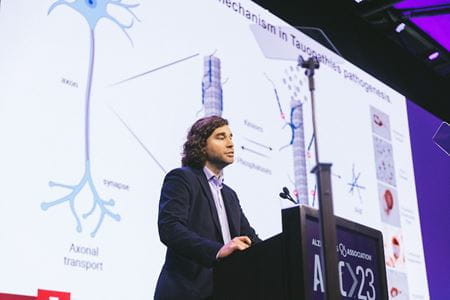Cristian Lasagna-Reeves, PhD, always knew there must be “something else” that contributed to tau protein tangles found in the brains of Alzheimer’s patients. Way back in 2008, as a grad student at the University of Texas–Galveston, his doctoral thesis explored the relevance of tau oligomers and sparked his interest in Bassoon—not the instrument, but a protein that serves as scaffolding for tau-seed propagation.
When he came to Indiana University School of Medicine as an investigator with the Stark Neurosciences Research Institute in 2017, Lasagna-Reeves finally got the opportunity to establish his own lab and delve further into the significance of Bassoon (BSN) as a contributor to neurotoxicity in Alzheimer’s. The resulting paper, published in Nature Neuroscience in November 2022, was named the “most impactful study published in Alzheimer’s research over the preceding two years” at the 2023 Alzheimer’s Association International Conference (AAIC) held in Amsterdam July 16-20, where Lasagna-Reeves received the Inge Grundke-Iqbal Award for Alzheimer’s Research.
He was among several IU School of Medicine researchers who presented at the AAIC, the largest and most influential international meeting dedicated to advancing dementia science. Liana Apostolova, MD, MS, FAAN, an IU Distinguished Professor and the newly named associate dean for Alzheimer’s disease research at IU School of Medicine, presented promising findings from Eli Lilly and Company’s Phase 3 clinical trial for Donanemab, a drug shown to slow cognitive decline in people with early Alzheimer’s disease.
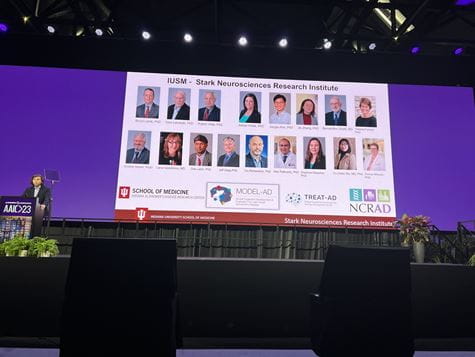 Andrew Saykin, PhD, director of the Indiana Alzheimer’s Disease Research Center and the Center for Neuroimaging at IU School of Medicine, chaired and presented a basic science session on multi-omics. Additionally, IU School of Medicine’s MODEL-AD and TREAT-AD Alzheimer’s research programs were highlighted at a pre-conference event sponsored by the National Institute on Aging and the Alzheimer’s Association.
Andrew Saykin, PhD, director of the Indiana Alzheimer’s Disease Research Center and the Center for Neuroimaging at IU School of Medicine, chaired and presented a basic science session on multi-omics. Additionally, IU School of Medicine’s MODEL-AD and TREAT-AD Alzheimer’s research programs were highlighted at a pre-conference event sponsored by the National Institute on Aging and the Alzheimer’s Association.
“When I joined IU School of Medicine, the IU name wasn’t known for basic science in the field of Alzheimer’s,” Lasagna-Reeves said. “Now people say, ‘You are the leaders.’ In a very short time, our recognition has exploded.”
IU School of Medicine and Stark have recruited several scientists from Lilly to help with Alzheimer’s drug development, including Alan Palkowitz, PhD, who leads the TREAT-AD program, Timothy Richardson, PhD, who leads TREAT-AD’s medicinal chemistry core, and most recently, Jeffrey Dage, PhD, who is leading research toward a blood test that could detect Alzheimer’s before major symptoms appear.
IU School of Medicine’s global impact also includes the National Centralized Repository for Alzheimer's Disease and Related Dementias (NCRAD), a central biobank in the United States that enables scientists from around the world to access critically important biological samples for new and ongoing research.
IU is emerging as a powerhouse in Alzheimer’s disease and related dementias research—from basic science research about the disease process to development of innovative therapies and patient care.
“With local partners such as the Indiana Biosciences Research Institute and Purdue University, a growing international network, and the strong pharma presence of Eli Lilly and Company, IU has the potential to be a major force in leading the field toward new disease solutions for decades to come,” Palkowitz said.
‘More than a paper’
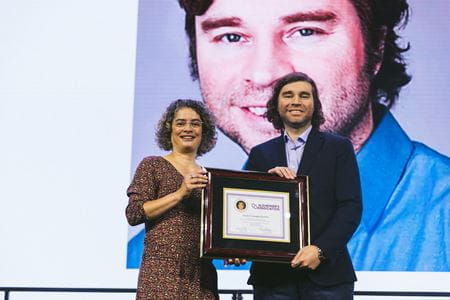 At another institution, Lasagna-Reeves said his research might have been “just a paper.” But at IU, his lab’s discoveries are on the fast track to helping actual Alzheimer’s patients. He’s working closely with Palkowitz and other researchers in the TREAT-AD program to develop a therapy that would target Bassoon and potentially stop tau tangles from forming.
At another institution, Lasagna-Reeves said his research might have been “just a paper.” But at IU, his lab’s discoveries are on the fast track to helping actual Alzheimer’s patients. He’s working closely with Palkowitz and other researchers in the TREAT-AD program to develop a therapy that would target Bassoon and potentially stop tau tangles from forming.
Lasagna-Reeves is also getting help from Jared Brosch, MD, who brings expertise from a clinical trial he is leading on an Alzheimer’s drug targeting the amyloid plaques linked to Alzheimer’s. Researchers agree that prevention of Alzheimer’s disease will take a multi-targeted therapy.
“Without this type of collaborative environment and support in the research line, it would be impossible for my research to have this impact,” Lasagna-Reeves said. “The real gamechanger is the collaboration with TREAT-AD to make this more than a paper. They want to start screening for molecules that decrease the levels of Bassoon and have already proven the concept in mice. They have a clear picture on how to move forward to clinical trials, and all of that can be done 100% at IU.”
Lasagna-Reeves’ discoveries about the significance of the Bassoon protein have grabbed the attention of the international research community for good reason.
“This work has provided evidence for why many direct tau antibodies that advanced into clinical development have failed to date,” Palkowitz said. “Even more exciting, Cristian’s work points to new therapeutic strategies that may have a better chance of impacting tau pathology and disease progression. This work has been quickly appreciated for the potential impact to the field.”
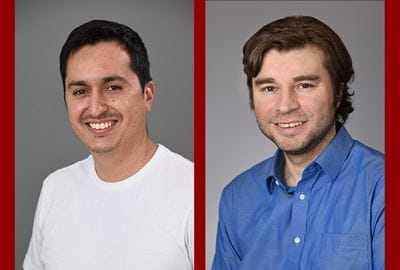 Under the mentorship of Lasagna-Reeves, postdoctoral fellow Pablo Martinez, PhD, the paper’s first author, shares in the excitement of the AAIC award. He also spoke at the international conference and presented a poster, as did the paper’s second author, Henika Patel.
Under the mentorship of Lasagna-Reeves, postdoctoral fellow Pablo Martinez, PhD, the paper’s first author, shares in the excitement of the AAIC award. He also spoke at the international conference and presented a poster, as did the paper’s second author, Henika Patel.
“I am immensely proud of this paper receiving international recognition because it acknowledges the effort we invested, not only in conducting the experiments but also in establishing collaborations with other exceptional scientists,” Martinez said.
When he was looking for a postdoctoral position in 2018, Martinez received offers from established labs but decided instead to work with the less experienced Lasagna-Reeves. They share a common heritage as Chilean scientists, along with over half of the technicians in the Lasagna-Reeves Lab.
“I saw in Cristian a scientist with a clear research direction, innovative ideas and, above all, someone who works alongside you, dedicated to enhancing your professional skills,” Martinez said. “Now, after four years of working in his lab, I can confidently say that my initial impression was right. I witness the dedication and passion Cristian possesses toward all lab members and the various projects we are running. His commitment to our growth and development is tireless, making him an excellent research scientist, mentor and leader.”
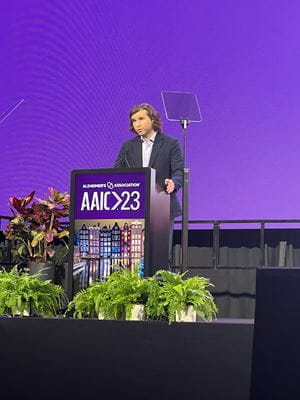 After earning his bachelor’s and master’s degrees from the University of Chile, Lasagna-Reeves was invited to work in the lab of a Chilean researcher at Johns Hopkins University School of Medicine in Baltimore. In 2006, he moved to the University of Texas Medical Branch in Galveston, where he earned his PhD before heading to Baylor College of Medicine in Houston for postdoctoral studies and, finally, moving to Indiana to open his lab in 2017.
After earning his bachelor’s and master’s degrees from the University of Chile, Lasagna-Reeves was invited to work in the lab of a Chilean researcher at Johns Hopkins University School of Medicine in Baltimore. In 2006, he moved to the University of Texas Medical Branch in Galveston, where he earned his PhD before heading to Baylor College of Medicine in Houston for postdoctoral studies and, finally, moving to Indiana to open his lab in 2017.
Lasagna-Reeves’ initial interest in science was inspired by his grandmother who worked as a lab technician in Chile. A photo taken of her in the lab hangs on his office wall.
With the international recognition of his lab’s Bassoon paper, Lasagna-Reeves and his team have been featured on Chilean news programs. Now his family living in Chile realizes the work he does in the lab will impact real people, like his aunt who is living with frontal temporal dementia, he said.
One of the many things Lasagna-Reeves appreciates about IU School of Medicine is that basic scientists can collaborate with physicians on the front lines of treating Alzheimer’s patients.
“Many postdocs at other institutions have never seen a patient with Alzheimer’s or talked with the family of a patient with Alzheimer’s,” he said. “At IU, we have communication with the clinicians. I emphasize to the trainees in my lab the importance of that personal aspect. Interacting with those patients motivates you—we’re trying to find a cure for a disease that is devastating.”
IU’s continuing work toward a cure
As a valuable national resource that supports Alzheimer’s research throughout the United States and beyond, IU School of Medicine is pioneering global collaboration. Learn more about the IU scientists behind international collaborations to end the suffering of Alzheimer’s disease:
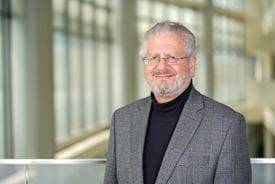 Andrew Saykin, PhD, started in psychology before becoming a multidisciplinary expert in neuropsychology, neuroimaging and medical genetics. Saykin is director of the Indiana Alzheimer’s Disease Research Center and the Center for Neuroimaging at IU School of Medicine and is a principal investigator for the global Alzheimer’s Disease Neuroimaging Initiative (ADNI). His research focuses on early detection of Alzheimer’s disease and precision medicine.
Andrew Saykin, PhD, started in psychology before becoming a multidisciplinary expert in neuropsychology, neuroimaging and medical genetics. Saykin is director of the Indiana Alzheimer’s Disease Research Center and the Center for Neuroimaging at IU School of Medicine and is a principal investigator for the global Alzheimer’s Disease Neuroimaging Initiative (ADNI). His research focuses on early detection of Alzheimer’s disease and precision medicine.
 Bruce Lamb, PhD, is not only an IU Distinguished Professor and renowned neuroscientist but also was an early advocate for federal funding of Alzheimer’s disease research. Lamb is director of the Stark Neurosciences Research Institute and leads the NIH-funded MODEL-AD program, which provides Alzheimer’s researchers with animal models for pre-clinical research before human clinical trials.
Bruce Lamb, PhD, is not only an IU Distinguished Professor and renowned neuroscientist but also was an early advocate for federal funding of Alzheimer’s disease research. Lamb is director of the Stark Neurosciences Research Institute and leads the NIH-funded MODEL-AD program, which provides Alzheimer’s researchers with animal models for pre-clinical research before human clinical trials.
 Alan Palkowitz, PhD, former head of discovery chemistry at Eli Lilly and Co., now leads the TREAT-AD drug discovery center at IU School of Medicine, a collaboration with Purdue University aimed at accelerating therapy development for Alzheimer’s disease. Palkowitz is also president and CEO of the Indiana Biosciences Research Institute.
Alan Palkowitz, PhD, former head of discovery chemistry at Eli Lilly and Co., now leads the TREAT-AD drug discovery center at IU School of Medicine, a collaboration with Purdue University aimed at accelerating therapy development for Alzheimer’s disease. Palkowitz is also president and CEO of the Indiana Biosciences Research Institute.
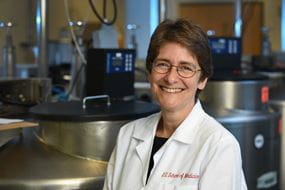 Tatiana Foroud, PhD, a statistical geneticist, is executive associate dean for research affairs at IU School of Medicine. She leads the National Centralized Repository for Alzheimer’s Disease and Related Dementias (NCRAD), which has distributed over 370,000 biological samples to further Alzheimer’s disease research around the world.
Tatiana Foroud, PhD, a statistical geneticist, is executive associate dean for research affairs at IU School of Medicine. She leads the National Centralized Repository for Alzheimer’s Disease and Related Dementias (NCRAD), which has distributed over 370,000 biological samples to further Alzheimer’s disease research around the world.

Liana Apostolova, MD, the newly named associate dean for Alzheimer’s disease research at IU School of Medicine, leads a first-of-its-kind, $45 million, NIH-funded study examining early-onset Alzheimer’s. The Longitudinal Early-onset Alzheimer’s Disease Study (LEADS) is following 500 cognitively impaired adults ages 40-64 over their lifetimes to help unlock mysteries about how Alzheimer’s disease manifests and progresses.
Learn more about IU School of Medicine’s expertise in Alzheimer’s and check out the school’s current Alzheimer’s disease news.
